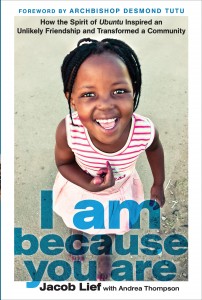
by guest blogger Jacob Lief, cofounder and CEO of Ubuntu Education Fund and author of I Am Because You Are: How the Spirit of Ubuntu Inspired an Unlikely Friendship and Transformed a Community (cowritten with Andrea Thompson; Rodale Books), from which the essay below is adapted
In late 2001, my organization, Ubuntu Education Fund—a nonprofit that helps vulnerable children in Port Elizabeth, South Africa—started developing our plans to begin building school libraries. We called it the Siyafunda (“We Are Reading”) Library Initiative.
I was in the office interviewing people for a computer resource job and soon met a charismatic young man named Qondakele Sompondo. As he was waiting, he looked over some of our materials about our upcoming programs, and told me, “I’d really like to apply for this library job.” His degree was in library science, and he felt passionate about the idea of bringing books into the schools—something that had never been done before in the townships. I told him that job didn’t exist, that the library program wasn’t going to get started for another six months.
“I’ll wait,” he said.
I was won over. We brought him on, and over the next few years, he helped us build eight school libraries. Qondakele was from the townships, and he felt driven to make a change for the children who lived there. “I was born in the community, and went to school here, with broken windows, no tables, no chairs,” he told me. He’d graduated in 1993, but even now, the school was the same. “It took me 15 years to shake off the bad education I got. That’s what’s killing South Africa,” he said. “You can’t really change the system. But you can take a small group and change that.”
As with any working relationship, sometimes tension built between Ubuntu and the community, particularly as we tried to work with the principal and teachers at Emfundweni Primary School, while my cofounder, Banks, continued to teach and we both worked on Ubuntu out of our little office there.
The teachers didn’t seem committed to working in the computer center, and I had grown frustrated with the dull incompetence that seemed to characterize so many of our interactions with the school personnel. I often had a difficult time biting my tongue when someone appeared to be acting inappropriately or undermined our work in some way. Banks would step in to calm me down. He knew how to absorb blows without striking back, to wait until emotions had cooled and it was possible to have a reasonable discussion.
The nadir of our relationship with the school came in 2002, when we opened the Irving Lief Siyafunda Library, a small, sturdy building set in the back courtyard of Emfundweni. A student had painted the entire building with a mural depicting scenes of learning and storytelling, and the bright exterior reflected the energy and hope that had gone into its construction.
We’d named it after my grandfather, a tough-as-nails Bostonian who definitely believed in the school of hard knocks. He was the kind of guy’s guy who believed in watching baseball and enjoying a good whiskey, and I’m not sure he ever understood my desire to go to Africa. While I was living with Banks in the town’s railroad flats that first summer, he’d died. I didn’t have a reliable means of communicating with my family, so I didn’t know about it until after the burial. Banks was with me when I heard the news, and he told me solemnly, “Jake, we must honor the ancestors. We must do something for him.” And so, four years later, we named this library for the students of Emfundweni after him.
Given its connection to my grandfather, this library, our first, had particular emotional weight for me. My wife, Lindsay, and my parents traveled to Port Elizabeth for the opening, and the days were filled with nervous anticipation.
The first sign of trouble came in a shipping container full of books. A few months before the library opened, National Geographic had written a short piece about Ubuntu, and a high school student in Seattle read it and decided to organize a book drive. She worked very hard to gather as many books as possible so that we could fill the shelves, but she clearly hadn’t realized that she could reject some donations.
When the shipping container arrived, it contained 25 copies of a PhD dissertation on agriculture in Western Australia, encyclopedias so outdated they identified a region of Africa as the Belgian Congo, and coloring books that had already been filled in. Imagine how devastated you’d be as a child to open a coloring book and find that it was already done!
Yet people at Emfundweni were so thrilled that a shipping container of books had been sent to them, they didn’t care. They put all these books in the library and thought it was wonderful. I wasn’t happy about it—I didn’t think that these books were worthy. Donating a book or clothing isn’t charitable if it’s something you’d otherwise throw away. It should be an investment, of the same quality you’d want for yourself. I took the principal aside and asked him, “How can you put books like this out for the children? They aren’t useful, they aren’t in good shape. The students deserve better.”
The answer he gave devastated me. He looked at me and said coolly, “Beggars can’t be choosers.”
The opening ceremony arrived a few days later. I stood in the courtyard under a beautiful blue sky and there, covering an entire wall, was a huge banner thanking the girl who had sent the books. Ubuntu had put hundreds of hours into this library, trying to provide a quality resource. Yet the school deliberately chose to celebrate a donation that was subpar. I realized that this was the way that the school had decided to put us in our place, and I was angry.
I calmed down, and we stayed there for another year before moving to a larger office. But my heart and soul left that day. That moment made me sad and angry in equal measures: sad that so many in the community truly believed they deserved no better than already-filled-in coloring books and out-of-date encyclopedias, and angry that a man in the position to change that attitude sought only to reinforce it.
As Ubuntu grows, we always refer back to an aspect of our guiding ethos: If it’s not good enough for your own child, then is it good enough?

Jacob Lief is cofounder and CEO of Ubuntu Education Fund, a nonprofit organization that takes vulnerable children in Port Elizabeth, South Africa, from cradle to career. Ubuntu redefined the theory of “going to scale” used of traditional development models; instead of expanding geographically, the group focuses on the depth rather than breadth of their programs within a community of 400,000 people. In 2010, he was named a Young Global Leader by the World Economic Forum, and in 2012 was selected as a member of the Clinton Global  Initiative advisory board. He splits his time between Brooklyn, New York, and Port Elizabeth, South Africa
Initiative advisory board. He splits his time between Brooklyn, New York, and Port Elizabeth, South Africa




I think Jacob took a very simplistic view of things, without actually factoring in the historical aspect.
Apartheid lasted 42 years. The most a native SA child could hope for was a middle school education and then a life of serving whites. 1994 was the first year classes were integrated and I believe it is still a work in progress in terms of what native South Africans believe they can aspire to and achieve. When you, your father and his father have been subjugated for decades, and then you are declared ‘free’, it is still a tenuous line you walk between understanding with your head and understanding with your heart. Daring to hope for a better life for your child, your community, when you could have been punished/killed by the government for believing it 10 years prior? I’m not surprised the teacher was reticent.
I am genuinely grateful to the owner of this site who has shared this impressive post at
here.